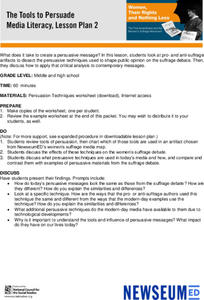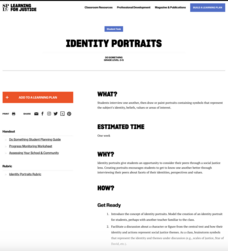PBS
Compare State Voting Laws Today with Laws of the Jim Crow Era
Georgia's law S.B. 202 is at the center of a lesson that asks young scholars to examine what critics say are Georgia's attempts to limit voting access to Black voters. Groups then investigate the voting laws in their own state, as well...
Newseum
Persuasion Portfolios
After class members brainstorm a list of current social and political issues, groups each select a different topic from the list to research. Teams create a portfolio of at least 10 examples of stories about their issue, stories that...
Newseum
Things Change, Things Stay the Same
Securing women the right to vote was a long time coming. Over the years, some aspects of the suffrage movement changed, and some things remained the same. Pupils research three time periods and collect evidence of key people, strategies,...
Newseum
The Making of Fake News: A Case Study
"Fake News" (stories that are entirely fabricated/fictional) is the subject of a case study of the search for Jestin Coler, the creator of some of the most famous fake news stories. After reading NPR's investigative report, scholars...
Newseum
The Tools to Persuade
After reviewing persuasion techniques, young historians examine how a specific technique was used in the pro- or anti-suffrage messages. They then examine how that same technique is used in modern-day media messages.
California Department of Education
Etiquette? What’s That?
After watching a video, reading articles about etiquette in the workplace, and engaging in discussions, high school seniors create a presentation to show what they have learned about business etiquette.
Learning for Justice
Change Agents in Our Own Lives
Everyone has the power to change their own lives. Young historians learn how they can become agents for change in their own lives and the community. The lesson focuses on positive role models and what motivates individuals to promote...
Teaching Tolerance
Where We Stand
Everyone is entitled to their own opinion. Academics learn strategies to share their opinions and agree or disagree with others in a respectful manner. The resource provides scenarios to help individuals form opinions and share them with...
Teaching Tolerance
Advertising on the Internet
Believe it or not, everyone plays a role in Internet advertising. Scholars explore the topic with a podcast about Internet advertising and personal identity. Next, partners plan and produce their own public service announcements to...
Constitutional Rights Foundation
The Dispute Over the South China Sea
Just who owns the South China Sea—and its vast resources—has been a conundrum for decades. Pupils explore the international law and disputes surrounding the resource-rich body of water, as well as China's claims over it. A background...
Teaching Tolerance
Oral History Project
Get up-close-and-personal with history using guidance for an oral history project. An engaging resource takes pupils through brainstorming through feedback for a project to interview and collect oral histories from members of their...
Judicial Branch of California
American Heroes
What makes a hero? After discussing the term and considering a book about Franklin D. Roosevelt, classmates work together to write a script and present their biography of a Great American hero. Notes sheets help group members organize...
Teaching Tolerance
Identity Portraits
When you look at me, what do you see? Young learners answer this question by creating a portrait that reflects the identity of one of their peers. First, class members create interview questions. Then, they interview classmates to...
National Endowment for the Humanities
La Familia
Young scholars identify at least one country where the Spanish language is spoken, describe similarities and differences between Spanish, Mexican, and Puerto Rican families, and practice speaking the Spanish words for several family...
Learning for Justice
Beauty is Skin Deep
If you are in need of a lesson on tolerance or the impact of media, this plan could be useful. The class begins with a brainstorming session in which they reflect on their own experiences with bias based on appearance. Next, they...
National Endowment for the Humanities
Responding to Emily Dickinson: Poetic Analysis
Learners explore Emily Dickinson's poem "Safe in Their Alabaster Chambers." For this Dickinson poem lesson, students analyze the poem as proof of Dickinson' awareness of her reader. Learners analyze her style and identify her editorial...

















